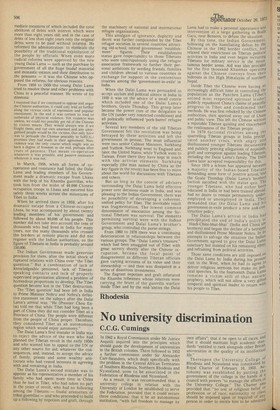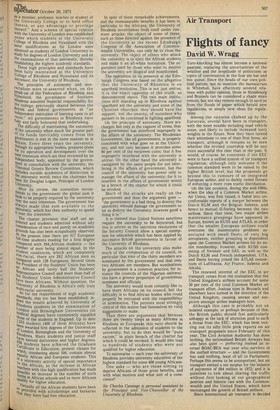Rhodesia
No university discrimination
C.C.G. Cumings
In 1942 a Royal Commission under Mr Justice Asquith inquired into the principles which should guide the development of universities in the British colonies. There followed in 1952 a further commission under Sir Alexander Carr-Saunders, which dealt specifically with the problem in the Central African Territories of Southern Rhodesia, Northern Rhodesia and Nyasaland, soon to be associated in the. Federation of Rhodesia and Nyasaland. As a result, it was recommended that a university college in relation with the University of London be established to serve the Federation, provided that it could secure three conditions: that it be an autonomous institution, "with full freedom to manage its
own affairs"; that it be open to all races; and that it should maintain high academic stn. dards "entitled to rank alongside other British lunei."versities in the quality of its intellectu
if al Thereupon the University College Rhodesia and Nyasaland was constituted 13:s. Royal Charter of February 10, 1955. An" tonomy was established by putting the government of the college in the hands of a council with powers "to manage the affairs of the University College." The Charter als° provided that "no test of religious belief or profession or of race, nationality or class should be imposed upon or required of.anY person in order to entitle him to be admitted
as a member, professor, teacher or student of the University College or to hold office therein, or any advantage or privilege thereof." And a scheme of special relation With the University of London was established under which students at the University College of Rhodesia and Nyasaland with the same qualifications as for London were admitted as students of London University to study for degrees of London University and sit the examinations of that university, thereby establishing the highest academic standards.
These high principles and standards have been fully maintained at the University College of Rhodesia and Nyasaland and its successor, the University of Rhodesia. The principles of autonomy and nonracialism were re-asserted whetl, on the break-up of the Federation of Rhodesia and, 14..yasaland, the government of Southern , odesia assumed financial responsibility for the college, previously shared between the British and federal governments, as " an Independent institution of learning open to all races. " All governments in Rhodesia have 1°11Y and fairly honoured that undertaking. The difficulty of maintaining the autonomy Of the university when much the greater part of its funds inevitably comes from the government is met in the same manner as in dritain. Every three years the university; prough its appropriate bodies, prepares plans or its operation and development over the Pext triennium which are then reviewed by an mdePendent body, appointed by the govern ent in consultation with the university, the Triennial Grants Review Committee, which Includes outside academics of distinction in the university world; twice the chairman has been Sir Douglas Logan, Principal of London University After its review, the committee recommends to the government the global sum it Inds to be properly required by the university over the next triennium. The government has ah:vaYs made that sum available to the University, which has then authority to spend It over the triennium.
The charter provision that staff are apPointed and students admitted without any consideration of race and purely on academic grounds has also been scrupulously observed. At the present time there are 517 European tull-time students reading for a first degree compared with 3840African students — the number of men being almost equal. In the „Student residences, which are completely "°n-racial, there are 282 African men as compared with 129 Europeans. Several times e President of the Students' Union has been rAfrican and lately half the Students' the Council and more than half of t Lue Students' Union Administrative Council' have been Africans. Without question, the _university of Rhodesia is Africa's only truly multi-racial university. AS tor the requirement or high academic rndards, this too has been established; indeed the results achieved by University of hodesia students in the examination of °11cion and Birmingham Universities (in ' medical degrees) have consistently equalled those pe of the students in England. Up to date .33 students (486 of them Africans) have been awarded first degrees of the Universities sirLondon, Birmingham and the University of 'lnodesia. Many students and junior staff ave R„ earned doctorates and higher degrees. s're5 students have achieved the Graduate Which, in Education, present classes for which, numbering about 100, contain almost ‘scIttaill' African and European students. This a university activity of special importance to the African, as the increase in African teachers with this high qualification has made rssible an increase in the number of sixth au„rMs in African schools and so more Africans 'mallfY for higher education.
_Virtually all the African students have been ;,? Provided with scholarships and bursaries `uat they have had free education. In spite of these remarkable achievements, and the immeasurable benefits it has been in particular to the Africans, the University of Rhodesia nevertheless finds itself under constant attacks; the object of some of these, such as those directed against the presence of the. University at the recent Edinburgh Congress of the Association of Commonwealth Universities, can only be to close the university. The object of others who attack the university is to eject the African students and make it an all-white institution. The arguments used by those who want to destroy the university are illogical and misinfoi.med.
The opposition to its presence at the Edinburgh Congress was based on the allegation that the University of Rhodesia is an apartheid institution. This is not just untrue; it is the exact opposite of the truth, as demonstrated above. The two main institutions still standing up in Rhodesia against apartheid are the university and some of the Christian churches: they should have the support, not the enmity, of outsiders who purport to be concerned in fighting apartheid.
On the principle of autonomy, there are charges, but only in the vaguest of terms, that the government has interfered improperly in the affairs of the university. The Rhodesian Government, like all governments, is properly concerned with what goes on at the University, and not only because it provides some 90 per cent of the recurrent costs; that it has improperly interfered with the university is untrue. On the other hand the university is castigated by the same people for not interfering in the affairs of government, but the council of the university has power only to manage the affairs of the university; for it to interfere in the affairs of government would be a breach of the charter for which it could be revoked.
Much of the attacks are really on the government and then the argument goes — "the government is a bad thing, to destroy the university whould damage the government so let us destroy the University, however good a thing it is."
It is claimed that United Nations sanctions require the university to be boycotted, but this is untrue as the sanctions resolutions of the Security Council allow a special exemption for education which has been applied by successive British governments in favour of the University of Rhodesia.
The attacks on the university also make much of the composition of its council, in particular that nine of the thirty members are nominated by the government and that only two Africans are members. But nominations by government is a common practice; for instance the councils of the Nigerian universities have a greater proportion of government nominees and officials.
The university would most certainly like to have more Africans on its council, but the difficulty.is to find African bodies who could properly be entrusted with the responsibility of nomination. The persons most strongly critical of this matter had themselves no valid suggestions to make. Then there are arguments that because there are twenty dings as many Africans in Rhodesia as Europea4s this ratio should be reflected in the admission of students to the university, but to do that would be "pure racism," in plain breach of the charter for which it could be revoked. It would also lead to hundreds of students who were not qualified for higher education.
To summarise — each year the university of Rhodesia provides university education of the highest standard for some 400 young Africans. One asks — who are those aiming to deprive Africans of those great benefits, and with what motives and what sort of a conscience?
Sir Charles Cumings is personal assistant to the Principal and Vice-Chancellor of the University of Rhodesia.



































































 Previous page
Previous page